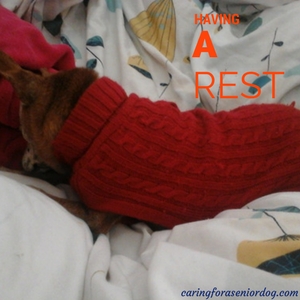
Have you recently started asking yourself the question – why does my dog sleep so much?
As dogs get older it is not unusual for sleep patterns to change or for them to sleep more. The question is what’s “normal” and what is caused by an underlying problem.

Is your dog sleeping or merely resting?
Many of us probably lump the two into the same category, I know I do, but there is a difference between full on sleeping, and just resting.
How much is too much?
The question should really be – how much is too much for my dog? While old dogs can sleep 18 hours a day, there are plenty of seniors who have as much energy as a 2 year old, with no signs of slowing down. The title “senior” being given simply because of the date on the calendar.
What is important is to pay attention to the changes you’re witnessing in your own dog, and whether or not he is sleeping too much relative to what’s “normal for him.”
Reasons for sleeping too much
Pain
When a dog is not feeling well or is in pain, he may retreat and spend more time sleeping…as we would do. If his pain is a result of something like arthritis for instance, sleep can be an escape from the pain we were totally unaware of. Stiffness may also cause your dog to remain in one place, and since he’s not moving around and has nothing to do, he’ll just sleep.
The thing is, dogs are good at hiding when they’re not feeling great, and many times we don’t even know it until the problem has gotten so severe, even your dog can’t pretend any longer.
Hypothyroidism
A common condition in older dogs, it is a decrease in thyroid levels which makes dogs sluggish, lethargic and prone to weight gain. Since fat dogs find it difficult to move around too much, they’ll stay in one place and sleep for lack of anything better to do.
CCD
One common result of canine cognitive dysfunction, or doggie dementia, is a reversal of day/night pattern of sleeping – sleeping all day, wandering at night. It may seem like a dog is sleeping more, when in fact it’s just at a different time than usual.
My senior dog Red has some dementia, but luckily it has not affected her sleep cycle.
Boredom
I add this as a possible reason because of conversations I’ve had with senior dog parents and clients I’ve worked with. Some pet parents who share their lives with old dogs leave them out of a lot of activities they used to include them in. They don’t take them out as much, or play with them like they used to. Many assume their dog is happier lying on their bed, so they leave them there.
Granted their dogs may be experiencing the pain of arthritis, or understandably do not have the stamina to walk as much as they used to. Fair enough, but what about buying a pet stroller so they can join you on your days out?
If you leave your big dog at home because you can’t get him into the car, how about a ramp?
He may not be able to run and fetch a ball, but you could play a game with him? How about a puzzle toy to keep his brain active?
A recent upheaval
Have you moved recently, or has any other big event taken place? Any upheaval in your dog’s life may be interrupting his sleep patterns so it seems like he’s sleeping more, when in fact he’s just making up for any he’s lost.

Exercising more
Has your dog started taking longer walks? Travelling with the family? Day trips? Maybe you’ve enrolled him in agility or other fun classes and these new activities have tired him out!
Monitor the changes you’re seeing
Take note of the changes you’ve been seeing and bring them with you to the vet, which we will talk about in a moment.
- Is your dog sleeping more all the time?
- Sleeping all day than up all night?
- How many hours at a time?
- Is it hard to wake her up?
- Does she wake up on her own?
Have you noticed other changes as well?
- Changes in eating – not as much, wanting more, lack of interest
- Peeing more
- Drinking more
- Wandering, getting stuck behind doors
- Not coming when called
- No interest in playing
- Limping/lame
- How is her coat looking? As shiny as ever or flaky and dull?
Now what?
I talk a lot about the importance of knowing our dogs, what’s normal for them and what isn’t. I also encourage anyone who sees any behaviour changes, no matter how slight, to make an appointment with their vet as soon as possible.
Problems should never be ignored in any pet, but if your dog has health issues or is frail, they are in greater danger of going downhill quicker than a dog in better overall health. A “wait and see” attitude in those cases is never a good idea.
Explain your concerns when you call for an appointment, so they don’t keep you waiting long to see the vet.

What’s the solution?
That depends on what your vet finds. I assume, based on my own experiences, he will want to do a urine and blood test. If you can, bring a urine sample with you because if he needs one and your dog peed right before you walked in the door, you may have to return with it later which may be inconvenient for you.
The sample should be no older than 2 hours, caught mid-stream and not refrigerated while you wait to leave.
A thyroid problem can be managed with medication, pain from arthritis with medication, supplements even acupuncture.
Why does my dog sleep so much – conclusion
If you notice your dog sleeping more than what is normal for him, please take him to the vet. If you’ve realised it’s because he’s bored or overdoing it, those are easy fixes.
If it’s been awhile since he’s had a senior check, now is as good a time as any to do it…just in case!
I hope your question “why does my dog sleep so much” has been answered, and if you would like to share your experience, please leave it in the comment section below or on my Facebook page.
Get your FREE report – Tell Tail Signs Your Dog May Have Dementia

 Why Does My Dog Pant So Much
Why Does My Dog Pant So Much
Recently, my Tiger sleeping a lot, this usually occurs after a long day of play. He is sleeping on his back with his paws in the air. Seems like he just doesn’t care. Any tips for me?
Hi, I’m not quite sure what you’re asking. Are you concerned he’s sleeping more than usual?